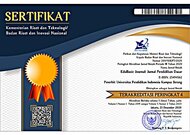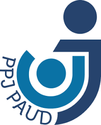ICT-based Elementary School in Indonesia: Curriculum Content, Strategies, and Challenges
Abstract
Along with the rapid growth of ICT, many schools offer ICT-based courses or programs. This study aimed to investigate the implementation of ICT-based elementary school in Indonesia focusing on the curriculum content, the strategies for integrating ICT curriculum into national curriculum, and the challenges they faced in running the school. Taking the case at SD ICT Al Abidin Surakarta, Indonesia, this study employed a descriptive qualitative method by conducting interview, observation, and document analysis. The result showed that the ICT curriculum included coding as the main skill by using several applications namely Code.org, Scratch Jr., Kodular, and Tinkercad.com. There were also several supporting skills taught namely rapid typing, hardware knowledge, basic Microsoft Office, graphic design, and ICT unplugged. They arranged the national curriculum content first and then added ICT content into daily learning activities. The challenges in running ICT school include the difficulty in convincing parents about the benefits of learning ICT skills, the absence of ICT school as a model in Indonesian context, and the limitedness of ICT teachers in the school. To solve it, they regularly conducted socialization to parents about ICT through seminar and social media campaign. The limitedness of ICT teachers was solved by providing regular training for class teachers to learn about ICT so they could teach ICT as well whenever needed. This study implies that ICT skills can be taught since early age and it can be integrated to formal education. For that purpose, it requires adequate learning facilities, skilled teachers, and mutual coordination with parents.
Keywords
Full Text:
PDFReferences
Arfé, B., Vardanega, T., Montuori, C., & Lavanga, M. (2019). Coding in primary grades boosts children’s executive functions. Frontiers in Psychology, 10, 1–19.
Çiftci, S., & Bildiren, A. (2020). The effect of coding courses on the cognitive abilities and problem-solving skills of preschool children. Computer Science Education, 30(1), 3–21.
Coravu, L., Marian, M., & Ganea, E. (2015). Scratch and recreational coding for kids. 2015 14th RoEduNet International Conference - Networking in Education and Research (RoEduNet NER), 85–89.
Giarti, S. (2016). Manajemen kurikulum dan pembelajaran berbasis ICT. Satya Widya, 32(2), 117–126.
Hafifah, G. N., & Sulistyo, G. H. (2020). Teachers’ ICT literacy and ICT integration in ELT in the Indonesian higher education setting. Turkish Online Journal of Distance Education, 21(3), 186–198.
Hermawan, H. D., Deswila, N., & Yunita, D. N. (2018). Implementation of ICT in education in Indonesia during 2004-2017. 2018 International Symposium on Educational Technology (ISET), 108–112.
Hockly, N. (2012). Digital literacies. ELT Journal, 66(1), 108–112.
Kaplancali, U. T., & Demirkol, Z. (2017). Teaching coding to children: A methodology for kids 5+. International Journal of Elementary Education, 6(4), 32–37.
Kutay, E., & Oner, D. (2022). Coding with Minecraft: The development of middle school students’ computational thinking. ACM Transactions on Computing Education, 22(2), 1–19.
Maruyama, Y. (2019). An investigation into parents’ concerns about programming education in Japanese primary schools. 15th International Conference on Cognition and Exploratory Learning in the Digital Age (CELDA), 329–344.
Mason, S. L., & Rich, P. J. (2019). Preparing elementary school teachers to teach computing, coding, and computational thinking. Contemporary Issues in Technology and Teacher Education, 19(4), 790–824.
Mishra, P., & Koehler, M. J. (2006). Technological pedagogical content knowledge: A framework for teacher knowledge. Teachers College Record, 108(6), 1017–1054.
Papadakis, S. (2022). Apps to promote computational thinking concepts and coding skills in children of preschool and pre-primary school age. In Information Resources Management Association (Ed.), Research Anthology on Computational Thinking, Programming, and Robotics in the Classroom, 2, 610–630.
Popat, S., & Starkey, L. (2019). Learning to code or coding to learn? A systematic review. Computers & Education, 128, 365–376.
Rich, P. J., Browning, S. F., Perkins, M., Shoop, T., Yoshikawa, E., & Belikov, O. M. (2019). Coding in K-8: International trends in teaching elementary/primary computing. TechTrends, 63(3), 311–329.
Setiawan, I., Satori, D., & Munir, M. (2019). School management based on ICT to improve the quality of education in Indonesia. Advances in Social Science, Education and Humanities Research (ASSEHR), 258, 404–407.
Staubitz, T., Klement, H., Renz, J., Teusner, R., & Meinel, C. (2015). Towards practical programming exercises and automated assessment in Massive Open Online Courses. IEEE International Conference on Teaching, Assessment, and Learning for Engineering (TALE) 2015, 23–30.
Tanang, H., Djajadi, M., Abu, B., & Mokhtar, M. (2015). Challenges for teachers in developing their teaching professionalism: A case study of secondary school in Makassar, Indonesia. Journal of Education and Learning, 8(2), 132–143.
Unahalekhaka, A., & Bers, M. U. (2021). Taking coding home: Analysis of ScratchJr usage in home and school settings. Educational Technology Research and Development, 69(3), 1579–1598.
Wong, G. K. W., Cheung, H. Y., Ching, E. C. C., & Huen, J. M. H. (2015). School perceptions of coding education in K-12: A large scale quantitative study to inform innovative practices. IEEE International Conference on Teaching, Assessment, and Learning for Engineering (TALE) 2015, 5–10.
Yusri, I. K., & Goodwin, R. (2013). Mobile learning for ICT training: Enhancing ICT skill of teachers in Indonesia. International Journal of e-Education, e-Business, e-Management and e-Learning, 3(4), 293–296.
DOI: https://doi.org/10.17509/ebj.v4i1.44668
Refbacks
- There are currently no refbacks.
Copyright (c) 2022 Universitas Pendidikan Indonesia
This work is licensed under a Creative Commons Attribution 4.0 International License.
This journal is indexed by




.png)




.png)
1.png)


1.png)

.png)